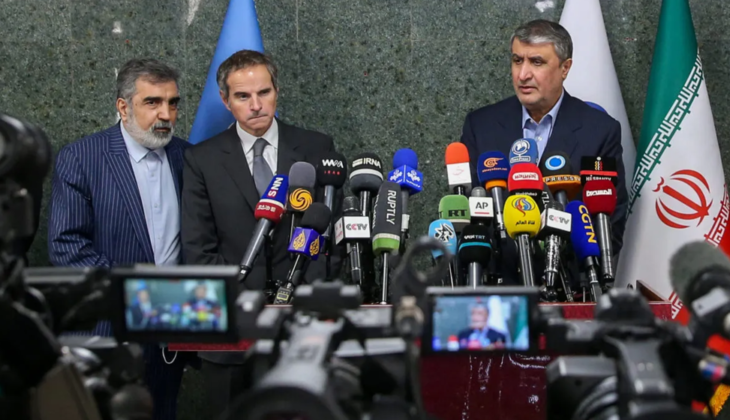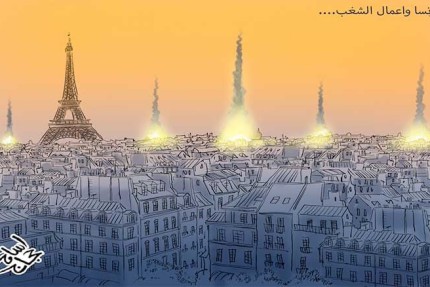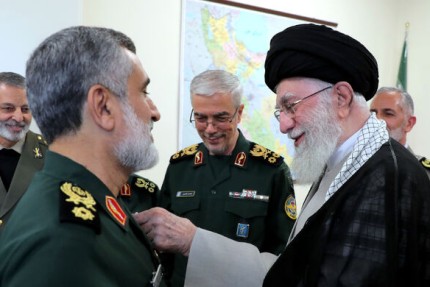Iran warns IAEA chief not to ‘complicate matters’

The spokesman for the Atomic Energy Organization of Iran (AEOI) has advised the UN nuclear agency's director general to refrain from complicating the situation through political statements.
The Wednesday warning by Behrouz Kamalvandi came after the head of the International Atomic Energy Agency (IAEA) called on Iran to resume talks “now” on reviving the 2015 nuclear accord before things get “much more problematic”.
“I amicably advise Rafael Grossi, the director-general of the [International Atomic Energy] Agency, to take distance from making unprofessional statements of political hue and color intended for media” consumption, Kamalvandi said.
“It is clear that if there is a technical issue, it should be presented professionally within the framework of the Agency’s duties and followed through its own channels and through the usual mechanisms of the Agency. Obviously, the arena for such interactions is not the media,” he said.
Kamalvandi was apparently referring to Grossi’s interview broadcast on June 12 on CNN, in which he made unusually menacing tropes against Iran.
“Recent history tells us that it is never a good thing to start saying to international inspectors, go home. Things get much more problematic,” the IAEA chief was quoted as saying.
“The director-general of the Agency, as the head of an international legal body, is expected to distance himself from political statements and positions and to be careful that his statements do not complicate the relationship between the members of the Agency,” Kamalvandi said on Wednesday.
Grossi sparked a controversy after he traveled to Israel and met the regime’s leaders late last month.
The IAEA has been on the receiving end of documents supplied by Israel about Iran’s nuclear program, which Tehran has rejected as fake and fabricated by MKO terrorists.
Following the visit, the IAEA Board of Governors adopted a resolution, accusing Iran of not cooperating with the agency which caught the Islamic Republic by surprise.
Iran’s response was swift and decisive, declaring that it had “taken practical quid pro quo steps which include installation of advanced centrifuges and deactivation of cameras operating outside the Safeguards Agreement”.
‘Firm response’: Iran fuels advanced centrifuges, disconnects cameras
Iran’s top nuclear official says the country has begun injecting uranium gas into advanced centrifuges and disconnected some UN nuclear agency cameras monitoring its sites outside Safeguards Agreement.
Last week, Iran’s top nuclear official Mohammad Eslami told national broadcaster that the country had begun injecting uranium gas into advanced centrifuges and disconnected some UN nuclear agency cameras monitoring its sites outside Safeguards Agreement.
“We have terminated the operations of a number of the agency’s cameras functioning outside the Safeguards, and tomorrow we will terminate the operations of the rest, which are 17 to 18 in total,” he said.
Grossi told CNN that without observation cameras, the IAEA would soon be unable to declare whether the Iranian nuclear program was “peaceful” or whether Iran was in the process of allegedly developing an atomic weapon.
Iran says all cameras installed within the framework of the Non-Proliferation Treaty and the Safeguards Agreement remain intact. It says the removed cameras are the ones Iran had allowed as a goodwill gesture.“There is no doubt that some unconstructive statements and political stances will complicate matters,” Kamalvandi warned Wednesday.
Comment
- Ali Mattar’s Significant Explanations on Hochstein’s Trip and US and Israel’s Conditions
- Would the Hamas Movement Come to an End with the Martyrdom of Yahaya Sinwar
- The Psychological Warfare of the Zionist Regime and the Need for a Credible Narration
- October 7th and a Return to the Zero Point/Why Israel is Thrown Back 70 Years
- The “Honest Promise 2” operation and its Diplomatic َAppendages
- Ali Mattar’s Significant Explanations on Hochstein’s Trip and US and Israel’s Conditions
- Would the Hamas Movement Come to an End with the Martyrdom of Yahaya Sinwar
- The Psychological Warfare of the Zionist Regime and the Need for a Credible Narration
- October 7th and a Return to the Zero Point/Why Israel is Thrown Back 70 Years
- Leader awards Fath badge to Gen. Hajizadeh for missile op
- The “Honest Promise 2” operation and its Diplomatic َAppendages
- Gains of Pezeshkian’s Visit to Qatar /Success of the Public Diplomacy
- 5 key points on the outcome of Iran’s attack against the Zionist regime
- Field Facts of the War on Lebanon/ The realities as They Are
- Some Tips on the Escalation of Clashes Between Lebanon and the Zionist Regime
- The Opportunities and Challenges Facing Pezeshkian’s Trip to New York
- Sana’a Possesses Modern Military Techniques and Technologies/ Details of Yemeni Advanced Missiles
- The Aim of Attacking Lebanon was a Targeted Assassination of the Civilians Not the Hizballah Forces
- Ali Mattar’s Significant Explanations on Hochstein’s Trip and US and Israel’s Conditions
- Would the Hamas Movement Come to an End with the Martyrdom of Yahaya Sinwar
- The Psychological Warfare of the Zionist Regime and the Need for a Credible Narration
- October 7th and a Return to the Zero Point/Why Israel is Thrown Back 70 Years
- Leader awards Fath badge to Gen. Hajizadeh for missile op
- The “Honest Promise 2” operation and its Diplomatic َAppendages
- Gains of Pezeshkian’s Visit to Qatar /Success of the Public Diplomacy
- 5 key points on the outcome of Iran’s attack against the Zionist regime
- Field Facts of the War on Lebanon/ The realities as They Are
- Some Tips on the Escalation of Clashes Between Lebanon and the Zionist Regime




